There is an unforgettable scene in the harrowing autobiography of a man living through the worst of modern Chinese history. In an Anti-Rightist Campaign struggle session in 1957, the crowd grows hysterical in its denunciations of Peter Liu and forbids him from smoking. Fearing they are about to become violent and might beat him to death, Liu asks the commander if he may go relieve himself in the WC outside the hall. Permitted to do so, he exits the building, gets on his bicycle, and rides home. The stunned interrogators are none too pleased by his brazen exit, but that’s not why he is soon sent off to over ten years of hard labor in the Chinese gulag, followed by another ten years of confined “employment.” In fact, his fate was already sealed long before when a PLA soldier discovered a firearm in the back of his family’s property that had been discarded in a junk pile by the retreating Japanese army.
Peter Liu’s Mirror: A Loss of Innocence in Mao’s China (Xlibris, 2001) embodies the history of modern China’s most turbulent era in one man’s lifetime (hence the title). For three decades after the 1949 “Liberation,” the entire country was one big labor camp. Many books have recounted this story, from the perspective of personal experience (Jung Chang, Wild Swans: Three Daughters of China, Anchee Min, Red Azalea) to more sweeping studies (Chang & Halliday, Mao: The Unknown Story, MacFarquhar & Schoenhals, Mao’s Last Revolution). What makes Liu’s account unique is that he was well versed in English since his college days, with a keen interest in literature and a novelist’s eye for detail already fully formed. Working for an American media bureau in Shanghai as a translator until it pulled out in 1949, he was offered the opportunity to join them in Taiwan but opted to stay on in the mainland to work for his country. He was to be plunged into a “three-decade nightmare.”
Liu’s ability to depict the Kafkaesque workings of the Revolutionary government from day one is fascinating, down to how life changed for the bewildered population. He recounts the plunging into hard times and collapse of his marriage to a pregnant, pampered girl from a moneyed family, holed up together in his mother’s bedroom while his mother slept in the sitting room:
“Once and again I talked with Lucy, trying to make arrangements mutually acceptable and avert a tragical breakdown, but each of these attempts ended up in her hysterical outbursts or my loss of temper. In time quarrels became scarce, and mutual intolerance gave way to indifference, till at last we ceased to speak to each other.”
The experience of this time is unbelievable to contemplate. Unable to find employment under the new regime as a journalist or translator due to his tainted family background, he is sent off to mandatory enrollment in North China People’s Revolutionary University. The students’ entire waking hours are spent hauling human excrement from the latrines in the daytime and then undergoing nightly self-criticism meetings. They vie with another to express how much they enjoy hauling feces but come off as forced and exaggerated, unlike the natural fondness a peasant feels for the same, as their leader explains:
“’You never did farmwork, so you don’t know what manure means. It means good harvest, on which a peasant depends for his livelihood. People fight over manure where it is scanty. They don’t hate it. They love it. The peasants wash themselves all right, but not in the same way—not with the same emotions. Remember what Comrade Zhang…told you about remolding your emotions? This is an example showing how your emotions differ from those of the working people. You have a long way to go before you really change.’”
Liu graduates from the six-month course with a poor evaluation. He is assigned to work at various remote rural outposts, until his real prison adventures get underway after being branded a Bourgeois Rightist in 1957: hard labor on a virtual starvation diet limited to small rations of carbohydrates, providing prisoners with just enough strength to engage in physical work but not enough to want to do anything else.
At the Revolutionary University, the students vie with another to express how much they enjoy hauling feces.
The real starvation diet begins during the “Three Bad Years” of 1959-61 (see Jasper Becker, Hungry Ghosts: Mao’s Secret Famine; Frank Dikötter, Mao’s Great Famine: The History of China’s Most Devastating Catastrophe, 1958-1962; and Yang Jisheng, Tombstone: The Great Chinese Famine, 1958-1962). Prison laborers were hardly privileged compared with the rest of the population during this time, but they were reluctantly excused from work, as they were all bed-ridden anyway. Liu almost dies. China was being run not by a competent statesman but a surrealist poet, who penned off-the-cuff sayings that were likely intended in jest but received as royal proclamations and applied with dead seriousness and devastating results: 20-40 million famine deaths. And like all megalomaniacs, he was less interested in the fate of the population than in himself and his harem of women, whom he assembled on his bed each night to suck out the yin essence from between their legs (Li Zhisui, The Private Life of Chairman Mao).
Once recovered, Liu is shunted around from one labor camp to another, without explanation or any indication of how much longer he still has to serve. More insanity follows during the Cultural Revolution, and prisoners aren’t spared, with many killed. A sudden decree in 1969 “frees” most of the prisoners, who discover they are free only on paper and are not allowed to leave, though they are now paid a paltry wage. Liu is eventually released, but not until 1979 is he fully pardoned and officially rehabilitated.
What enabled him to keep going whatever the circumstances was an unwavering conviction in personal justice, all narrated in a calm and compassionate voice, a lucid reporter’s voice seemingly unaffected by the whirlwind of events of which he was both eyewitness and victim.
After his memoir was completed in 1988, Liu followed up with his own Chinese translation, published as part of a series of confessional accounts by various writers on the Revolution’s early decades. The 10,000-copy run of the Chinese edition, 刘乃元著,《历劫不悔》(河南人民出版社, 1998), sold out within a month, before the entire series was, and remains, banned. On the 50th anniversary of the Anti-Rightist campaign in 2007 (several months before his death), Liu along with many other former “Bourgeois Rightists” signed a letter requesting greater public acknowledgement of the Government’s wrongs. The request was ignored, and all signers learned that they were henceforth forbidden from leaving the country.
I met Peter Liu in 2001 in Beijing, then 78, a friendly, articulate man who still commanded the fluent English in which he penned his book. He gave me his pre-publication copy of Mirror. I belatedly read it three years after the author’s death. I have no excuse; the book got waylaid, as so many good books do.
There were 20-40 million famine deaths across a country run by a surrealist poet rather than a competent statesman.
China has attained much freedom and prosperity in the decades since. The comfort level is now fairly high, at least for the roughly third of the country that are relatively well off. Even for the other two thirds trying to claw their way out of the barrel, life has obviously improved in many respects.
In my Beijing neighborhood of Shuangjing (a formerly rural area known as the “Twin Wells”), I can choose from among the usual complement of Cantonese, Sichuan, Hunan, Manchurian, Guizhou, Yunnan and Muslim Chinese restaurants and numerous international establishments as well (some of them owned and operated by foreigners), along with enough bars and cafés to satisfy your well-traveled social rat. All cafés and some restaurants have free Wi-Fi (many foreign websites are blocked but this can be traversed with VPN software). Some coffeehouses roast their own Arabica beans. The wine selection in higher-end supermarkets approaches that of Western countries, though rather pricier with the high import tariffs. Due to lax Chinese zoning laws, the Houhai and neighboring Nanluoguxiang nightlife areas alone easily have more bars than the entire city of Chicago, my hometown. There is nothing I can’t find here that I can’t find in any other country.
Yet in other respects China remains stuck in the regime mentality and practices of the 1960s-70s. At whatever end of the social scale, from lowly service jobs to white-collar managerial positions, group coercion operates on the same model Peter Liu that experienced at Revolutionary University: inhuman working hours coupled with endless meetings. The former keeps workers physically, and the latter psychologically, under control.
Those in the employ of the government (teachers, office and service workers, etc.) have it the best, with an eight-hour workday and one or two days off on the weekend. For the rest, it’s the workweek of Victorian England before the introduction of labor laws. Labor laws do exist in China but are blithely ignored and sporadically enforced. The default workweek is seven days with one or two days off per month, depending on the boss’s whim. In factories and construction sites, in shops, restaurants and hair salons, and for domestic helpers in homes, the workday consists of the net remainder of the 24-hour day after sleep and meals have been subtracted. This generally means a twelve-hour workday, give or take an hour or two. Domestic workers have it the worst, as the housework and childcare is never-ending; many are never given any time off or even allowed out of the house. There is more oversight in the case of factory labor, but employees aren’t left with much free time to themselves—an hour or two back in the dorm to wind down before preparing for bed. Dormitories are segregated by sex, with five to ten people sharing a room. There is not much time for things like romance, not to mention places for couples to meet in private.
Much has been made of improvements in Chinese factory workers’ wages in recent years, as a result of the aging population, the shrinking labor pool and its greater bargaining power. But this improvement is confined almost exclusively to pay raises. Working conditions and hours remain as oppressive as ever. Given the high turnover rate in factory and service jobs, workers are seldom hired on a permanent basis or provided with any benefits. Those gravely injured on the job are quietly given some financial compensation, on condition they don’t file a complaint or sue for damages, and let go. Although construction workers generally enjoy a slightly shorter workday (there is only so much heavy manual labor a person can handle), they are among the most vulnerable: liable to be financially devastated by the notorious practice of having their wages withheld till the end of the year before the Spring Festival holiday and then stolen when the company packs up and flees. Since so many workers are kept in the dark about labor rights and don’t want to lose their job, they tend to go along with this abuse.
Not just office workers but all workers have frequent meetings. For service workers, they take the form of public dressing-downs or roll calls known as the “admonitory speech” (xunhua) or more colloquially, the “meeting” (kaihui). This frightful activity, particular to China, is the logical successor to the earlier Communist era’s ritual struggle sessions for scapegoating and weeding out counterrevolutionaries, and now, bad workers. They are a daily sight: the staff of a restaurant, hair salon or other local business lined up military-barracks fashion in front of the shop before their day and evening shifts, sometimes right out on the sidewalk in public view, as a manager lectures or yells at them, singling out individuals for shaming purposes, or rallies them with motivational chanting. Curiously, restaurant roll calls are usually stern affairs while the salon counterpart is often cheery and upbeat.
The oft-cited rationale for these public roll calls is that employees are invariably young greenhorns from the countryside. As the farm hasn’t prepared them for the rhythms of the city, they need intensive training, even humiliation, to turn them into good workers—and remind them of how lucky they are to have such work. But while it’s the only form of training they know, I wonder how many regard the grimmer variety of xunhua as essential to their discipline or training. A restaurant in the Chinese city of Dandong once filmed a promotional demonstration of a staff roll call. The owners unlikely suspected how bizarre the sight of waitresses flinging themselves on the floor in the furious boot-camp-like display would come off to viewers of the viral video (“Dandong Arirang Restaurant Training Exercise”).
It is very bad form for any job interviewee not to proclaim his or her eagerness to work unlimited hours without conditions or remuneration concerns.
White-collar workers experience a less militaristic but no less ruthless workplace regimen, in terms of the domination it achieves over their life. It is very bad form for college graduates landing a job interview not to proclaim their eagerness to work unlimited hours without conditions (recall the students’ enthusiastic hauling of feces in Peter Liu’s Mirror). Salary rates are typically not advertised or disclosed and interviewees are not expected to ask; and by not asking, of course, they receive the lowest possible salary. Many are initially hired on probation, which can last months, at greatly reduced or no pay at all. To demonstrate worthiness, the employee is given little time off and works the same insane shifts as the most exploited of service workers.
Office workers lucky enough to be given Western-style nine-to-five conditions are reminded that time off is not a right but a privilege. It’s common suddenly to be asked to work overtime right before finishing your shift, as a test of your loyalty and submissiveness. Overtime pay is virtually unheard of. Psychological control extends to making employees feel guilty for taking their regular days off—or preventing them from doing so. At an educational testing center where I once worked in Beijing, I was surprised one day to find a Chinese female staff member I knew dressed informally in jeans and a sweater instead of her uniform. She said it was her day off. I asked her what she was doing there. Her boss wanted her there, she said. She didn’t have anything to do; just her presence was required. Precisely because it was absurd and excessive, the psychological control he had over her was so effective.
The office meeting is different only in content, not form, from the incessant political meetings the Chinese suffered through in the early decades of the revolution, recreated in all their methodical fascination in Liu’s Mirror. They are indispensible, of course, in the operations of any workplace, but as bosses also tend to hate meetings, they are conducted expeditiously in order to shorten the agony for everyone. (Some of the better-run Chinese companies in the private sector are now conducting meetings on the Western efficiency model, but they remain the exception.)
Work meetings today are different only in content, not form, from the incessant political meetings the Chinese suffered through in the early decades of the revolution.
When meetings exceed their practical purpose, they function to bolster workplace control and discipline. The Chinese office meeting is primarily symbolic: the act of attending is more important than any items on the agenda. I hear countless stories of meetings that go on forever with no purpose except to allow the boss to preen himself—and to test employees’ servitude in quietly putting up with it. Male workers at the management level have it the worst. Their workday starts at the office and continues in the evenings in private restaurant rooms where clients are feted with relentless toasting and drunkenness to hammer down business deals, or if no clients are present, fealty is paid to the boss with the same ritual toasts.
Students are variously initiated into the culture of meetings depending on the school, but one instance stood out for me in a university I taught at in Beijing. Graduate students were fined 500 Yuan ($80) for any department meeting they failed to attend, whatever their excuse. Besides department meetings, certain university courses, such as the mandatory “politics” courses which all students must take during every semester, are the education realm’s version of symbolic downtime, serving to keep students busy doing nothing rather than something constructive (more on which in Chapter 5).
White-collar workers lucky enough not to be saddled with long hours are kept in line by an array threats and penalties. They are fined for all manner of minor infractions, docked from their pay. One former student who found a job as a reporter for a government-run English-language newspaper quit before her first year was up because she had never received a full month’s pay. Money was deducted from every paycheck for infractions she was never informed about; some months she only got half her salary. Of course, stealing workers’ wages for arbitrary offenses is not so much a disciplinary mechanism as simply a means of extracting more company profits.
Another common method of wage theft is the cellphone “leash”—fining workers for not responding immediately to phone calls. One woman declined a job at a major beverage firm in Beijing upon noticing a clause in the contract requiring her to have her cellphone on everyday (including off days) from 8 am to 10 pm and respond to any calls within five minutes or be fined 30 Yuan. That wasn’t so bad. Another friend who works at a top law firm in Shanghai must have her cellphone on 24/7 and respond at once to calls or text messages at any hour of the night. The extension of workplace discipline into employees’ private life certainly makes for a relaxing shower, and great sex. Could company-installed in-home surveillance cameras be that far off?
White-collar workers are held on a particularly tight leash while on business trips, including trips abroad. As a rule they are intentionally kept too busy to have any free time for sightseeing or socializing. Time and again I have asked Chinese acquaintances how they enjoyed Europe or the U.S. after being sent there on a business trip. The usual answer is they didn’t at all. When they weren’t shadowing their boss and catering to his every need late into the evening in meetings and restaurants, they were expected to be on round-the-clock call in the hotel. They would never dare appear so selfish as to request a night out on the town. The oft-cited rationale for not leaving employees to their own devices on a business trip is the patronizing refrain that it’s all for their safety.
Things are not so monolithic and grim as to exclude any sliver of hope. There is another side. A growing number of Chinese are putting a premium on their time and their quality of life and opting out. Some engage in freelance employment or launch their own business. You can see them working on their laptops in Starbucks, Costa, and other cafés proliferating in China’s cities. College students are increasingly starting up online stores right in their dorm rooms, with the intention of making enough money never to have to work for anyone. Despite limited space for stocking their goods, it’s a brilliant co-opting of campus space and the perfect antidote to all the wasted time spent in mandatory politics courses. These trends among the younger generations will become a welcome threat to the old business model that relies on extreme exploitation and negative incentives to maximize profit. It gives some cause for optimism.
* * *
Like this post? Buy the book (see contents):
At the Teahouse Café – Essays from the Middle Kingdom
Related posts:
The Chinese university: A primer for prospective foreign teachers
Questioning China’s “5,000 years” master trope
Black forest cake blues: The customer service problem
Categories: China

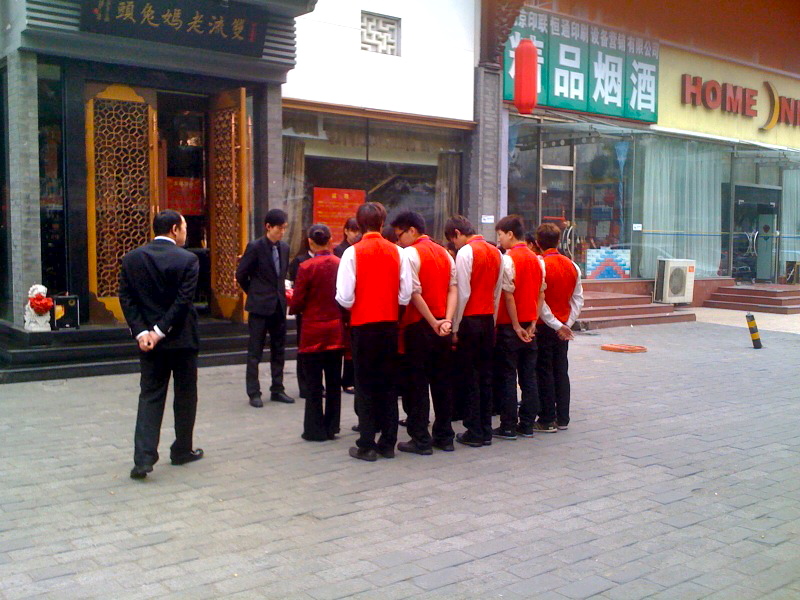
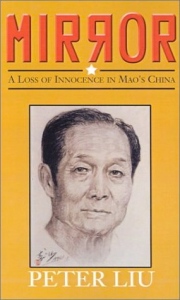

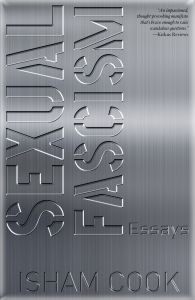









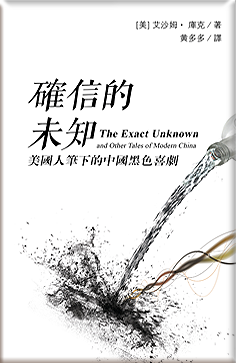
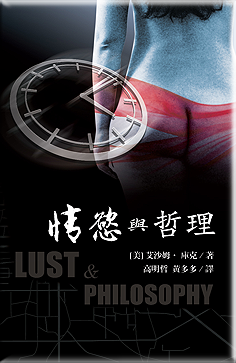

At least part of, if not all, what they were taught in the “Revolutionary College” is still taught now, from primary school, to college, and for MA, and for PhD, as long as in China, exactly the same wording – one wonders, how powerful it is that something can be maintained as such throughout the many decades. The difference is, the “learning” appeared as being interactive – discussion, comment, etc. back then; now it is simply imparted.
The word “formality” in first type of workplace abuse reminds me of the amusing comment which makes more sense linguistically in the Chinese original, “什么社会主义、共产主义,都不符合中国国情,中国的国情是形式主义” – formality-ism is truer to China than socialism or communism. But socialism or communism is almost only for politics, this formality-ism? Everywhere.